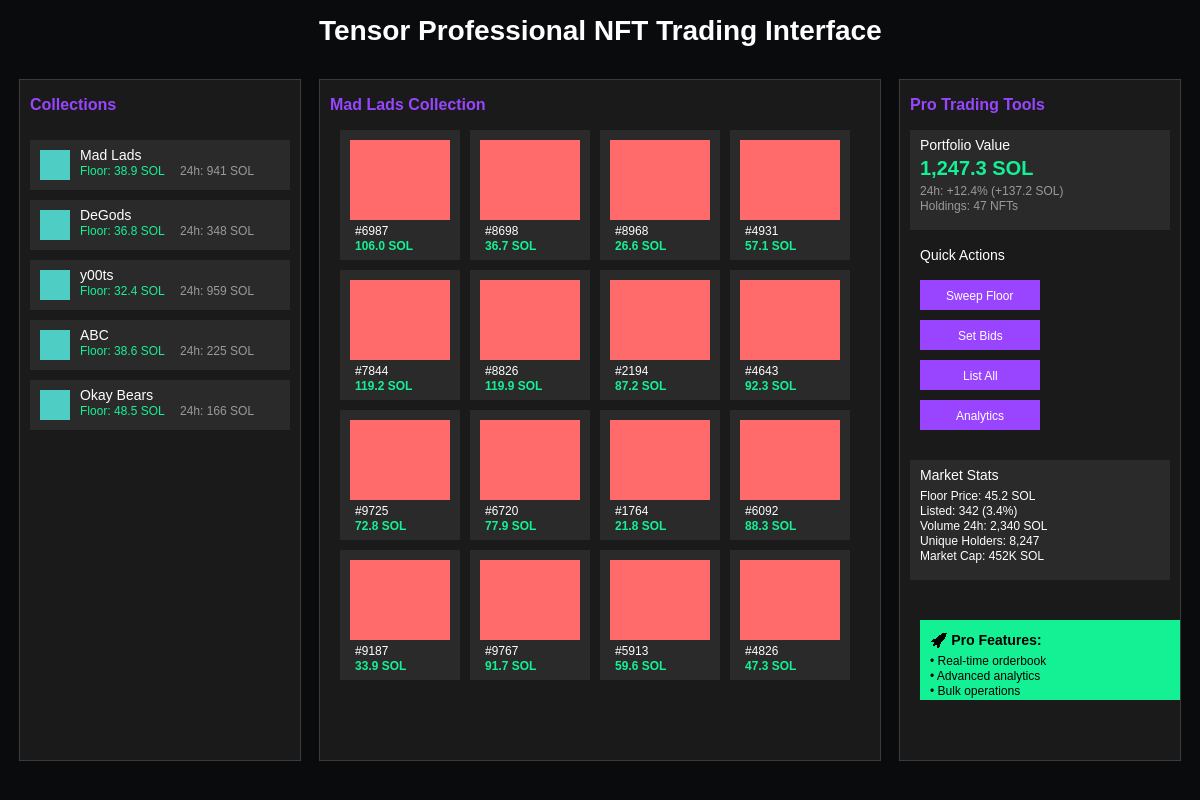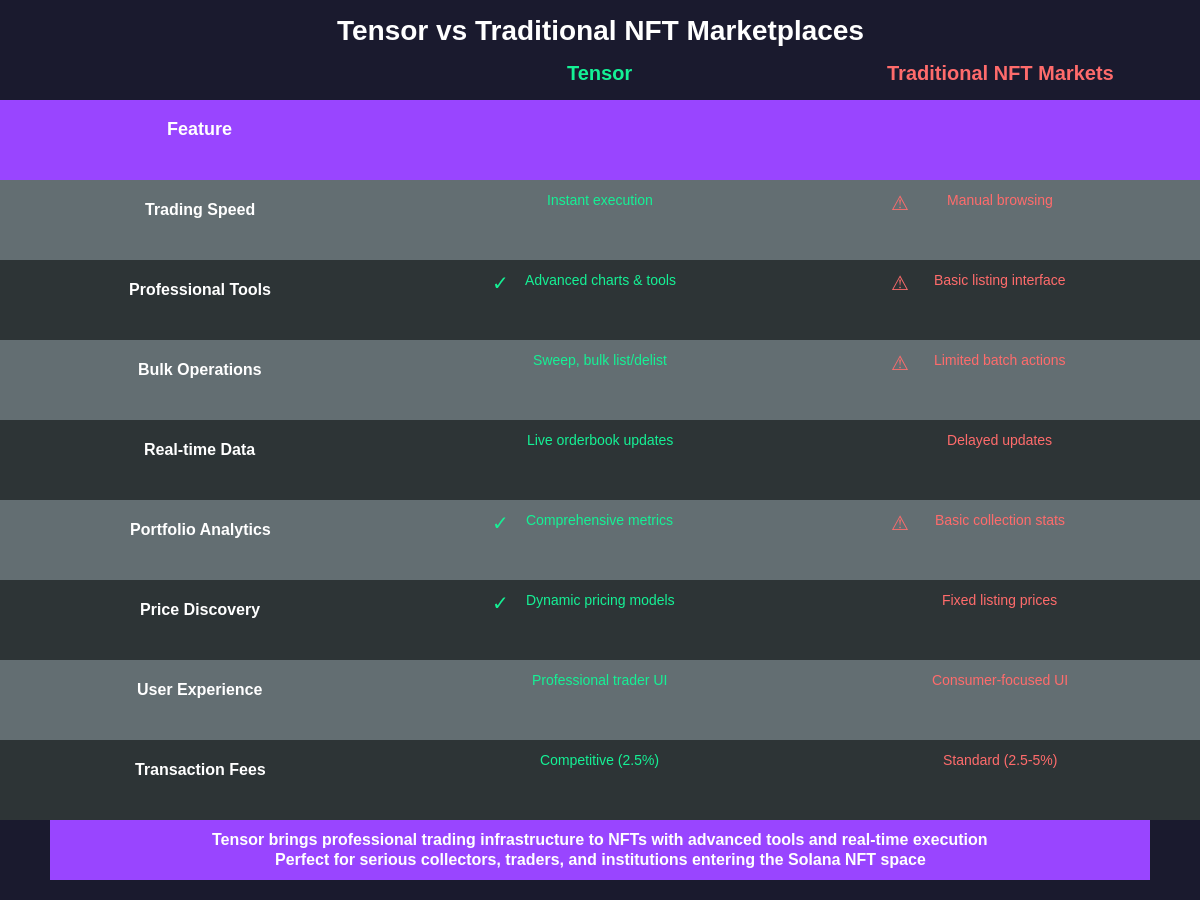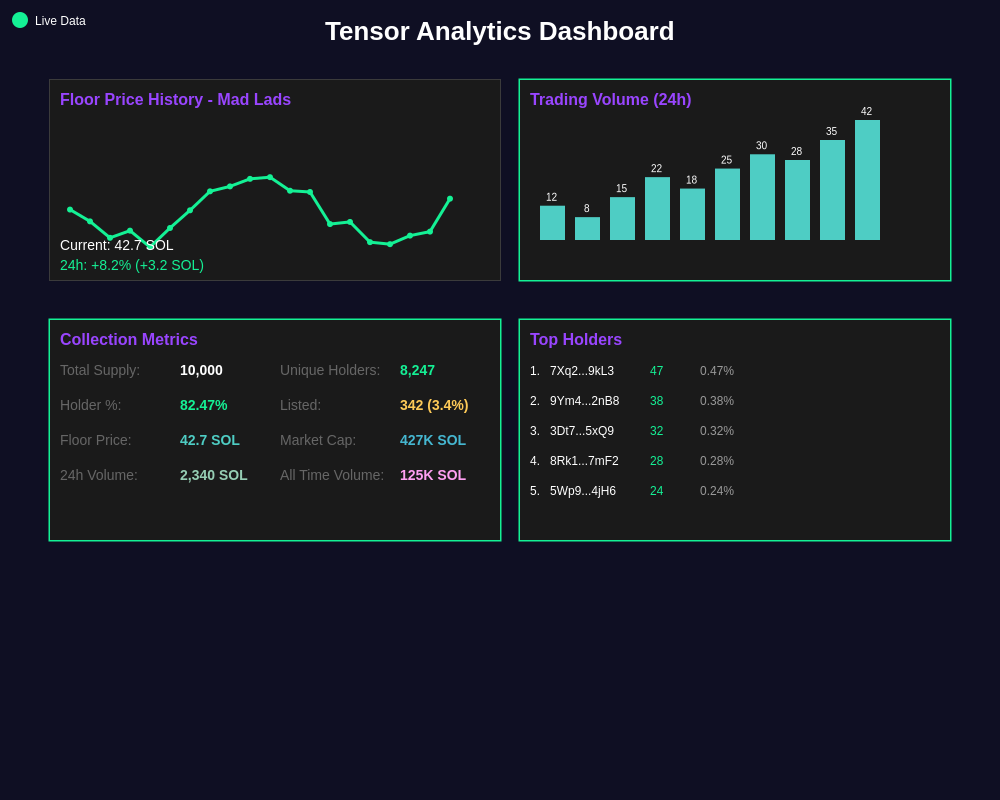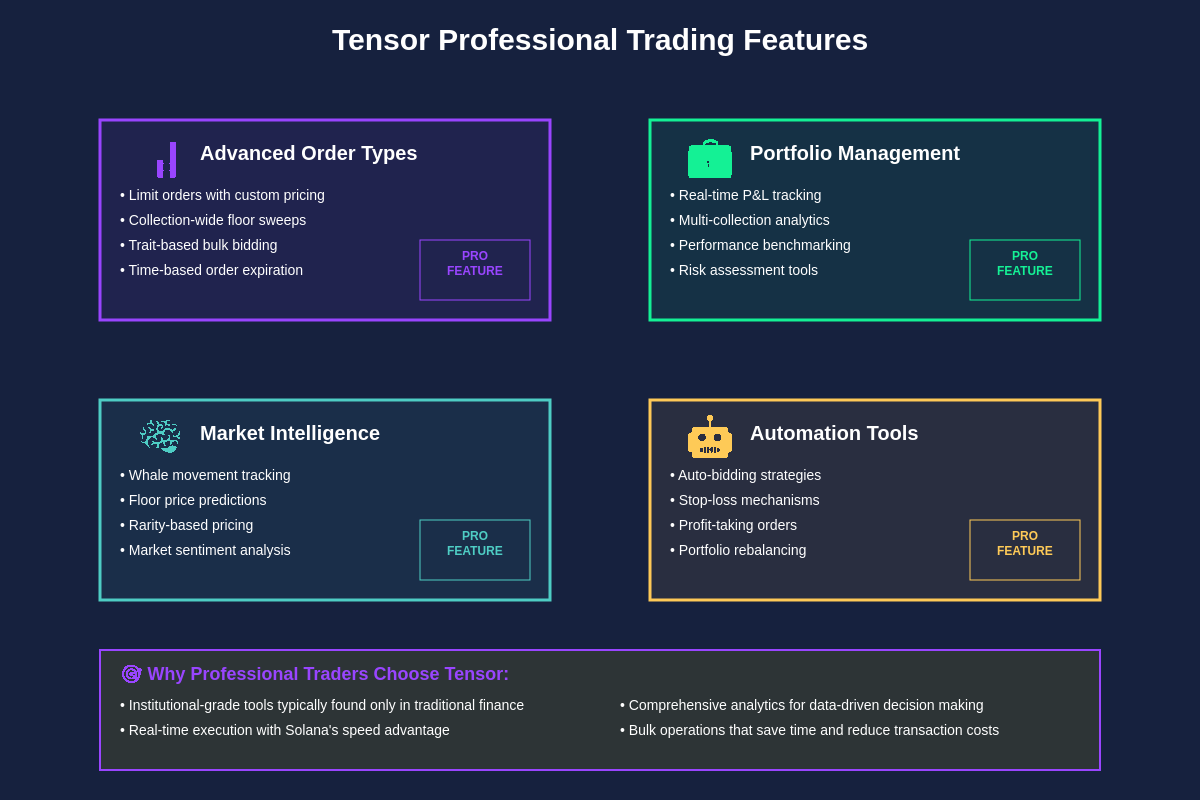The Evolution of NFT Trading Infrastructure
The non-fungible token marketplace landscape on Solana has undergone a dramatic transformation with the emergence of Tensor, a platform that brings institutional-grade trading tools and professional-level analytics to the world of digital collectibles. Unlike traditional NFT marketplaces that focus primarily on discovery and basic buy-sell functionality, Tensor has positioned itself as the premier destination for serious NFT traders, collectors, and institutions who demand sophisticated tools, real-time data, and advanced trading capabilities that mirror those found in traditional financial markets.
The platform represents a fundamental shift in how NFT trading is approached, moving beyond the simple gallery-style interfaces that have dominated the space toward a comprehensive trading ecosystem that acknowledges NFTs as serious financial instruments deserving of professional-grade infrastructure. This evolution reflects the growing maturation of the NFT market on Solana, where collections like Mad Lads, DeGods, and y00ts have established themselves as blue-chip assets with substantial trading volumes and institutional interest, necessitating more sophisticated tools for effective market participation.
Tensor’s emergence coincides with Solana’s advantages in speed and cost-effectiveness, creating a synergistic relationship where the blockchain’s technical capabilities enable the kind of high-frequency, low-cost trading that professional NFT traders require. The platform leverages Solana’s sub-second finality and minimal transaction fees to offer experiences that would be prohibitively expensive on other blockchains, making professional NFT trading accessible to a broader range of participants while maintaining the technical sophistication demanded by institutional users.
Professional Trading Interface and User Experience
The heart of Tensor’s value proposition lies in its sophisticated trading interface that transforms NFT trading from a casual browsing experience into a data-driven professional activity. The platform features a multi-panel layout reminiscent of traditional trading terminals, with dedicated sections for collection browsing, real-time market data, portfolio analytics, and advanced order management tools that enable traders to execute complex strategies with precision and efficiency.

The collection browser provides comprehensive filtering and sorting capabilities that go far beyond basic attribute searches, incorporating advanced metrics such as rarity rankings, historical price performance, holder distribution, and liquidity indicators that help traders identify opportunities and assess risk. Each collection page displays extensive analytics including floor price history, volume trends, holder concentration, and market depth data that enables informed decision-making based on quantitative analysis rather than speculation or emotional responses.
The platform’s order management system supports multiple order types including limit orders, collection-wide sweeps, trait-based bulk bidding, and time-based expiration settings that allow traders to implement sophisticated strategies without constant manual monitoring. These features are particularly valuable for professional traders who need to manage large portfolios across multiple collections while maintaining precise control over their risk exposure and capital allocation strategies.
Portfolio tracking capabilities provide real-time profit and loss calculations, performance attribution analysis, and comprehensive analytics that help traders understand their performance across different collections, time periods, and trading strategies. The system tracks not only individual NFT performance but also portfolio-level metrics such as correlation analysis, risk-adjusted returns, and benchmark comparisons that enable traders to optimize their strategies and improve their decision-making processes over time.
Advanced Analytics and Market Intelligence
Tensor’s analytical capabilities represent perhaps its most significant differentiation from traditional NFT marketplaces, providing users with access to institutional-grade market intelligence tools that enable data-driven trading decisions. The platform aggregates and analyzes vast amounts of transaction data, holder information, and market activity to generate insights that would be impossible for individual traders to compile independently.

The analytics dashboard provides comprehensive collection metrics including supply distribution, holder concentration analysis, listing behavior patterns, and price discovery mechanisms that help traders understand market dynamics and identify potential opportunities. Advanced charting tools display price movements, volume patterns, and volatility metrics with the granularity and sophistication typically found in professional trading platforms, enabling technical analysis approaches that can inform timing and positioning decisions.

Market intelligence features include whale tracking capabilities that monitor large holder activities, floor price prediction models based on historical patterns and market conditions, and sentiment analysis tools that aggregate social media activity and community engagement metrics to provide insights into market psychology and potential price movements. These tools are particularly valuable in the NFT space where market sentiment and community dynamics play crucial roles in price discovery and collection performance.
The platform’s rarity analysis goes beyond simple trait counting to incorporate market-based rarity assessments that consider not only statistical rarity but also market demand and trading patterns for specific traits and combinations. This approach provides more accurate valuation models that help traders identify undervalued assets and understand the premium that different traits command in the market, enabling more sophisticated collecting and trading strategies.
Integration with Solana DeFi Ecosystem
Tensor’s deep integration with the broader Solana DeFi ecosystem creates unique opportunities for NFT traders to leverage their collections in ways that extend far beyond simple buying and selling. The platform connects with major DeFi protocols to enable NFT-based borrowing and lending, liquidity provision for NFT-backed trading strategies, and cross-protocol arbitrage opportunities that maximize the utility and earning potential of NFT holdings.
The integration with Solana’s liquid staking protocols allows NFT traders to maintain yield-generating positions in their SOL holdings while actively trading NFTs, creating a more capital-efficient approach to portfolio management. This capability is particularly important for serious traders who maintain substantial treasuries and need to optimize their capital allocation across different opportunities while maintaining the liquidity necessary for active trading strategies.
Cross-protocol compatibility enables Tensor users to access liquidity from multiple sources including traditional AMM protocols, order book-based DEXs, and specialized NFT liquidity protocols, ensuring that traders can execute large orders with minimal slippage and market impact. This integration is crucial for institutional users who need to execute significant transactions without revealing their intentions or moving markets against their positions.
The platform also leverages Solana’s program composability to enable complex transaction types that combine NFT trading with DeFi operations in single atomic transactions, reducing execution risk and transaction costs while enabling more sophisticated trading strategies. These capabilities position Tensor not just as an NFT marketplace but as a comprehensive trading infrastructure that acknowledges the interconnected nature of modern DeFi ecosystems.
Institutional Features and Compliance Framework
Recognizing the growing institutional interest in NFTs as an asset class, Tensor has developed comprehensive features specifically designed to meet the needs of professional investment managers, family offices, and institutional collectors who require sophisticated tools and compliance capabilities. The platform provides advanced permission management systems that enable multi-user access with customizable role-based controls, audit trails, and approval workflows that meet institutional governance requirements.

The institutional dashboard provides comprehensive reporting capabilities including detailed transaction histories, performance attribution analysis, tax reporting tools, and compliance documentation that simplify the administrative burden of managing large NFT portfolios. These features are essential for institutional users who must maintain detailed records for regulatory compliance, investor reporting, and internal risk management purposes.
Risk management tools include position sizing calculators, correlation analysis, concentration limits, and automated alerts that help institutional users maintain appropriate risk exposures across their NFT holdings. The platform’s integration with traditional portfolio management systems enables institutions to incorporate NFT holdings into their broader asset allocation models and risk management frameworks, facilitating the institutional adoption of NFTs as a legitimate asset class.
Custody solutions provide secure storage options with multi-signature requirements, hardware security module integration, and insurance coverage that meet institutional security standards. These capabilities are crucial for institutional adoption, as professional investment managers require the same level of security and operational oversight for NFT holdings as they maintain for traditional financial assets.
Market Making and Liquidity Provision
Tensor’s sophisticated market structure includes features specifically designed to enhance liquidity and price discovery through professional market making activities. The platform provides tools that enable experienced traders to act as liquidity providers for specific collections, earning fees while improving market efficiency and reducing price volatility for other market participants.
The automated market making features allow users to set dynamic pricing strategies that adjust bid and ask prices based on market conditions, inventory levels, and risk parameters, creating more efficient markets while generating consistent returns for liquidity providers. These tools are particularly valuable in less liquid collections where traditional market making strategies can provide significant value to both market makers and the broader trading community.
Cross-collection arbitrage tools identify price discrepancies between similar NFTs across different collections or between different marketplaces, enabling sophisticated traders to profit from market inefficiencies while contributing to overall price discovery and market efficiency. The platform’s integration with multiple data sources and real-time pricing feeds enables these strategies to operate with the speed and accuracy necessary for profitable execution.
The liquidity aggregation features pool orders from multiple sources to provide users with access to the deepest possible liquidity pools, reducing execution costs and market impact for large trades while improving the overall trading experience for all market participants. This approach creates network effects where increased usage leads to better liquidity and pricing for everyone, establishing Tensor as the natural center of liquidity for Solana NFT trading.
Community-Driven Development and Governance
Tensor’s development philosophy emphasizes community input and user feedback in shaping the platform’s evolution, recognizing that the most successful trading platforms are those that respond effectively to the actual needs of their user base. The platform maintains active communication channels with traders, collectors, and developers to identify pain points, feature requests, and emerging opportunities in the rapidly evolving NFT landscape.
The governance framework includes mechanisms for community members to propose new features, vote on development priorities, and participate in decision-making processes that affect the platform’s direction. This approach ensures that Tensor continues to evolve in ways that serve the needs of its most active and engaged users while maintaining the technical excellence and professional standards that distinguish it from competitors.
Developer API access and documentation enable third-party developers to build applications and tools that integrate with Tensor’s infrastructure, creating an ecosystem of complementary services that enhance the platform’s value proposition. These integrations include portfolio management tools, automated trading bots, analytics platforms, and educational resources that serve different segments of the NFT trading community.
The platform’s commitment to open-source development and transparency helps build trust within the community while enabling external security audits and code reviews that enhance platform security and reliability. This approach aligns with the broader ethos of the Solana ecosystem and DeFi movement, where transparency and community governance are considered essential elements of long-term sustainability and success.
Educational Resources and Professional Development
Understanding that sophisticated trading tools are only valuable when users understand how to employ them effectively, Tensor has invested significantly in educational resources and professional development programs designed to help users maximize their trading effectiveness. The platform provides comprehensive documentation, video tutorials, and live training sessions that cover everything from basic platform navigation to advanced trading strategies and risk management techniques.
The educational content covers both technical aspects of using the platform and broader market education including NFT valuation methodologies, collection analysis techniques, and market psychology insights that help users develop more effective trading approaches. This educational focus is particularly important in the NFT space, where many participants are transitioning from other areas of crypto or traditional finance and need specialized knowledge to succeed.
Professional development programs include mentorship opportunities, trading competitions, and community events that help users learn from experienced traders while building networks within the professional NFT trading community. These programs recognize that trading success often depends as much on psychological factors and community connections as on technical analysis and platform capabilities.
The platform also provides regular market analysis and research reports that help users understand broader trends in the NFT space, collection-specific developments, and macroeconomic factors that influence NFT markets. This research helps users contextualize their trading decisions within broader market dynamics and develop more informed long-term strategies for building and managing NFT portfolios.
Security Architecture and Risk Management
Given the high-value nature of many NFT transactions and the irreversible nature of blockchain operations, Tensor has implemented comprehensive security measures and risk management systems designed to protect users from both technical vulnerabilities and human error. The platform employs multiple layers of security including smart contract audits, penetration testing, and continuous monitoring systems that protect against both known attack vectors and emerging threats.
User security features include multi-factor authentication, hardware wallet integration, transaction confirmation systems, and customizable security settings that allow users to implement appropriate protection measures based on their risk tolerance and transaction patterns. The platform provides detailed security guidance and best practices documentation that helps users understand and mitigate common risks associated with NFT trading.
Smart contract security measures include formal verification processes, multiple independent audits, and bug bounty programs that incentivize security researchers to identify and report potential vulnerabilities before they can be exploited. The platform maintains insurance coverage for certain types of losses and has established emergency response procedures for handling security incidents should they occur.
Risk management tools help users avoid common trading mistakes including overpaying for assets, taking excessive concentration risk, and falling victim to market manipulation schemes. The platform provides alerts and warnings for potentially problematic transactions while maintaining user autonomy and avoiding overly paternalistic restrictions that might interfere with legitimate trading strategies.
Technical Infrastructure and Performance Optimization
Tensor’s technical architecture is specifically optimized for the high-performance requirements of professional NFT trading, with systems designed to handle large volumes of simultaneous users, complex analytical queries, and real-time data processing requirements. The platform leverages Solana’s technical capabilities while implementing additional infrastructure optimizations that ensure consistent performance even during periods of high market activity.
The data infrastructure includes multiple redundant systems for collecting, processing, and serving market data with minimal latency, ensuring that users have access to the most current information available when making trading decisions. Real-time price feeds, transaction monitoring, and market depth data are continuously updated and made available through both the web interface and API endpoints for automated trading systems.
Performance optimization includes sophisticated caching strategies, database indexing, and content delivery networks that minimize load times and ensure responsive user experiences even when accessing complex analytical tools or processing large datasets. The platform’s architecture is designed to scale horizontally as usage grows, ensuring that performance remains consistent as the user base expands.
API infrastructure provides programmatic access to all platform features with rate limiting, authentication, and monitoring systems that enable professional users to integrate Tensor’s capabilities into their own trading systems and workflows. The API design follows industry standards and includes comprehensive documentation that facilitates integration while maintaining security and system stability.
Future Development and Market Expansion
Tensor’s roadmap includes ambitious plans for expanding both the platform’s capabilities and its market reach, with development priorities focused on maintaining leadership in professional NFT trading tools while expanding accessibility to new user segments. Planned features include additional analytical tools, expanded DeFi integrations, mobile applications, and support for additional blockchain networks that will broaden the platform’s addressable market.
The expansion strategy includes partnerships with institutional service providers, integration with traditional finance systems, and development of white-label solutions that enable other platforms to incorporate Tensor’s trading technology. These initiatives recognize that the future of NFT trading likely involves greater integration with traditional financial systems and broader adoption across different blockchain ecosystems.
Research and development efforts focus on emerging technologies including artificial intelligence for market analysis, machine learning for price prediction, and advanced cryptographic techniques for privacy-preserving analytics. These investments position Tensor to maintain its technological leadership as the NFT trading landscape continues to evolve and mature.
International expansion plans include localization efforts, regulatory compliance initiatives, and partnerships with regional service providers that will enable Tensor to serve users in markets with different regulatory requirements and cultural preferences. This global approach recognizes that NFT adoption is a worldwide phenomenon that requires platforms capable of serving diverse user bases with varying needs and requirements.
The platform’s long-term vision encompasses becoming the primary infrastructure layer for professional NFT trading across multiple blockchain networks while maintaining the focus on user experience and technical excellence that has established its current market position. This vision requires continued investment in technology, talent, and community development while remaining responsive to the evolving needs of the NFT trading community and broader trends in digital asset adoption.
Disclaimer: This article is for informational purposes only and does not constitute financial, investment, or trading advice. NFT trading involves significant risks including total loss of invested capital, high volatility, liquidity risks, and regulatory uncertainty. The NFT market is highly speculative and prices can fluctuate dramatically based on market sentiment, technological developments, and regulatory changes. Past performance does not guarantee future results. Before engaging in NFT trading, carefully consider your financial situation, risk tolerance, and investment objectives. Consult with qualified financial advisors and conduct thorough research before making any investment decisions. Trading platforms and their features can change without notice, and technical issues may affect trading ability. Never invest more than you can afford to lose, and be aware that NFT investments may become worthless. This content is not endorsed by any trading platform or financial institution mentioned.